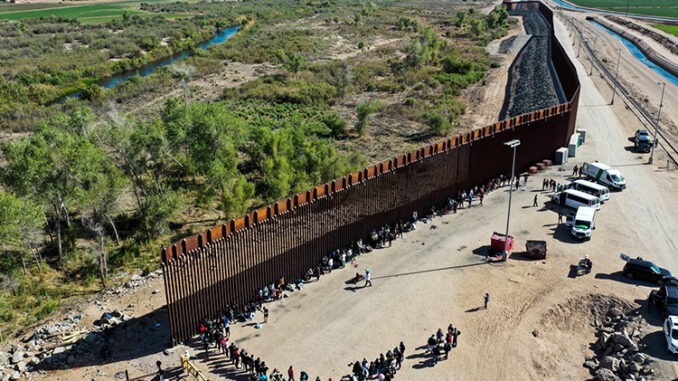
A majority of U.S. Hispanics (75%) describe the recent increase in the number of migrants seeking to enter the United States at its border with Mexico as a major problem or a crisis. A majority (74%) are also critical of the way the U.S. government is handling the situation at the southern border.
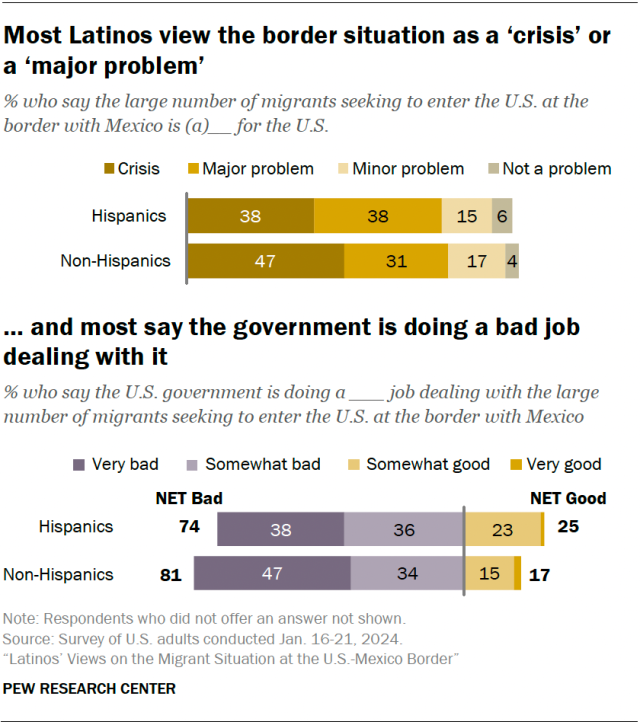
But Hispanics are less likely than non-Hispanics to describe the migrant situation at the border as a crisis or to say it is leading to more crime. Both groups also disagree on the possible effects of several policy proposals on the migrant border situation.
Yet Latinos are just as likely as other Americans to follow the news about the migrant situation at the border, according to a survey of U.S. adults conducted Jan. 16-21 by Pew Research Center.
For more on the general public’s views about immigration, read “How Americans View the Situation at the U.S.-Mexico Border.”
In December 2023, the number of encounters with migrants crossing into the United States from Mexico reached its highest monthly total on record, according to government statistics. This peak is part of a broader growth in migrant encounters at the border in recent years.
Historically, a vast majority of these encounters have involved people migrating from countries in Latin America. But more recently, migrants from all over the world, including Russia, India and China, have made up a growing share of those crossing the border.
The survey also found that 51% of Hispanics say dealing with immigration should be a top priority for the president and Congress to address this year, though other areas like strengthening the economy (75%), improving the education system (66%) and improving the jobs situation (65%) are higher up on their list.
Hispanics’ views of proposed changes to U.S. immigration policies
Many Latinos see potential benefits in some of the policy proposals put forward to address the migrant situation at the U.S.-Mexico border. However, for many proposals asked about in the survey, just a third or fewer view them as helpful to the situation.
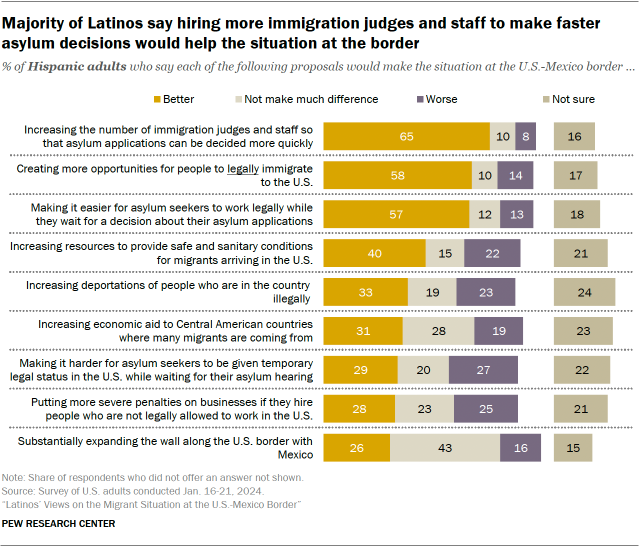
- A majority of Latinos (65%) say increasing the number of immigration judges and staff so that asylum applications can be decided more quickly would make the migrant situation better. Only 8% say it would make the situation worse.
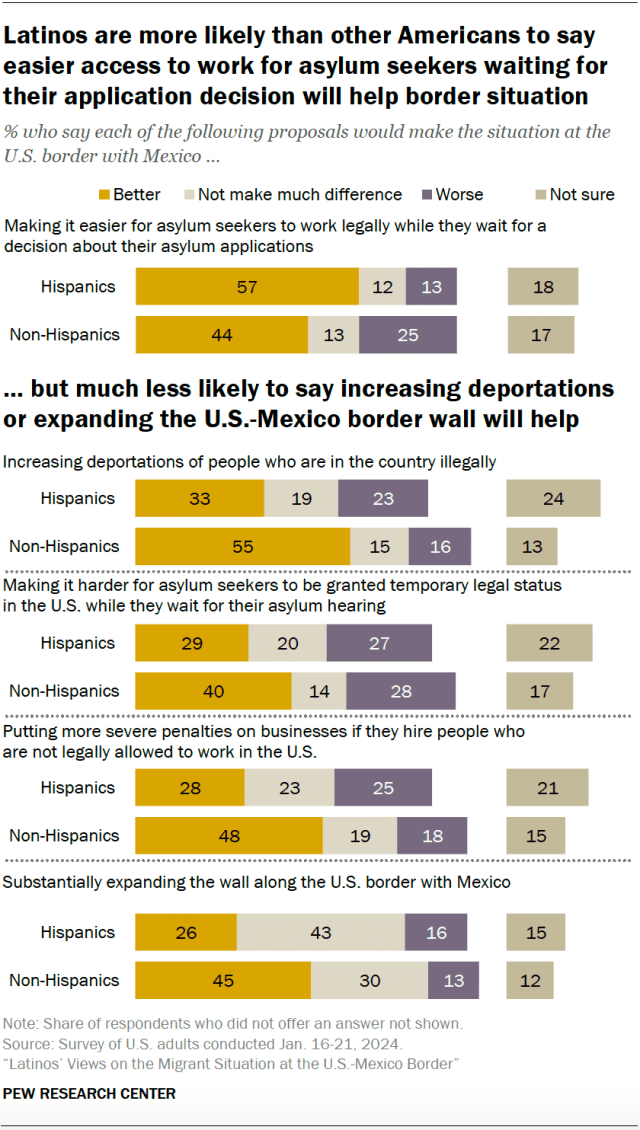
- Latinos are split on whether making it harder for asylum seekers to be granted temporary legal status in the U.S. while they wait for their asylum hearing will make the situation better (29%) or make it worse (27%).
When it comes to making it easier for asylum seekers to work legally while they wait for a decision about their asylum applications, Hispanics (57%) are more likely than other Americans (44%) to say it would improve the border situation. This is the only policy proposal in the survey that Latinos view more favorably than other U.S. adults do.
On the other hand, Latinos are less likely than other Americans to see the benefits of increasing deportations of people who are in the country illegally, punishing businesses more severely if they hire people who are not legally allowed to work in the U.S., or expanding the wall along the U.S.-Mexico border.
- 33% of Hispanics say increasing deportations of people who are in the country illegally would help the border situation, compared with 55% among other U.S. adults.
- 28% of Latinos say placing more severe penalties on businesses if they hire people who are not legally allowed to work in the U.S. would help. About half (48%) of non-Hispanics share the view.
- 26% of Hispanics say substantially expanding the wall along the border with Mexico would help the situation, while 45% of non-Hispanics say the same.
Hispanics’ views on why so many migrants try to enter the U.S. from Mexico
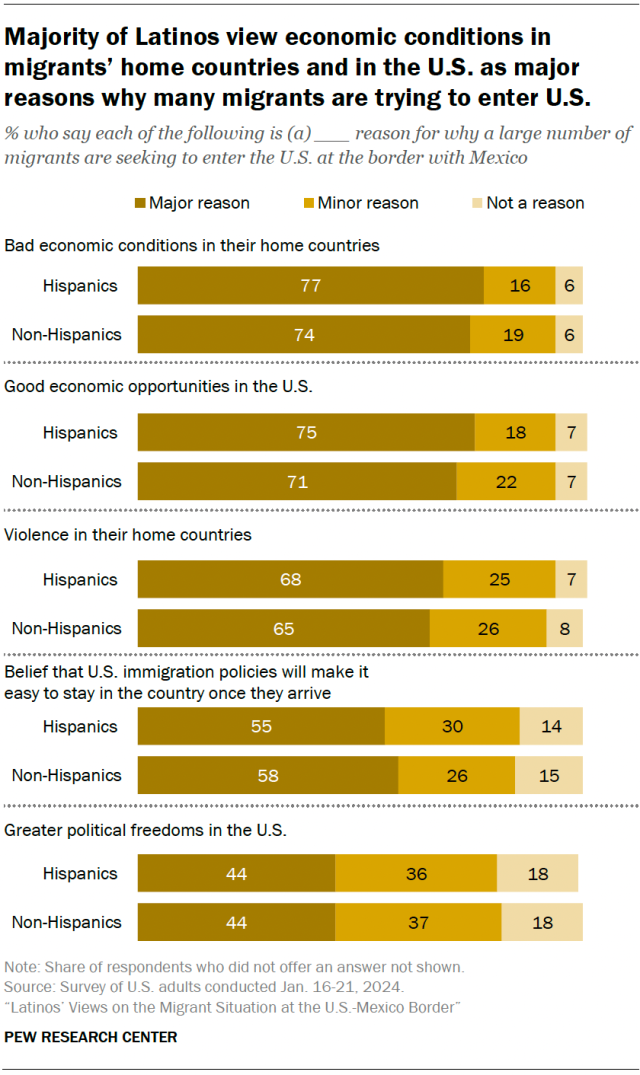
Majorities of Latinos cite multiple reasons for why a large number of migrants are seeking to enter the country at the U.S.-Mexico border.
Large majorities of Latinos view bad economic conditions in migrants’ home countries (77%) and good economic opportunities in the U.S. (75%) as major reasons why many migrants are seeking to enter the U.S. at the border.
About two-thirds of Hispanics say violence in migrants’ home countries (68%) is a major reason for the border situation.
Fewer Latinos view migrants’ belief that U.S. policies allow for them to easily stay once they arrive as a major reason, though about half (55%) hold this view. Meanwhile, 44% say migrants’ belief in greater political freedoms in the U.S. is a major reason so many migrants are coming to the U.S. today.
Notably, Hispanic and non-Hispanic adults share similar views across the five migration factors asked about in the survey.
Partisanship and views of immigration policies
Among Latinos, Democrats and Democratic leaners are just as likely as Republicans and Republican leaners to cite economic conditions in the U.S. and in migrants’ home countries as major reasons for the migrant situation at the border.
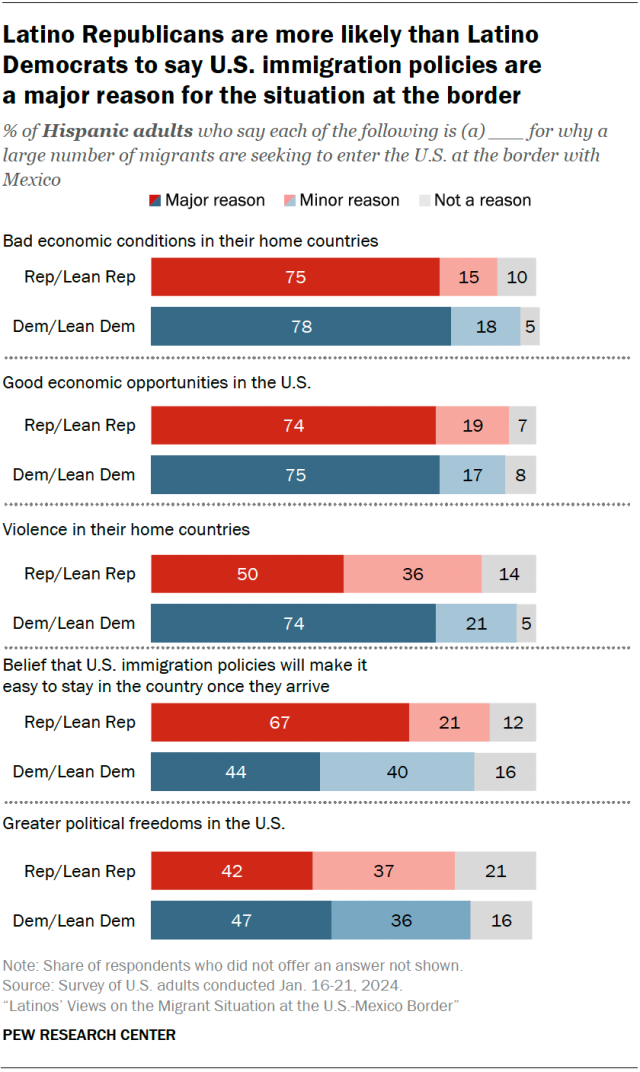
However, among all U.S. adults, Democrats are more likely than Republicans to cite good economic opportunities in the U.S. and bad economic conditions in migrants’ home countries as major reasons for the border situation.
Among Hispanics, partisan differences emerge when it comes to other factors:
- 74% of Hispanic Democrats say violence in migrants’ home countries is a major reason for the migrant border situation, compared with 50% of Hispanic Republicans who cite it as a major reason.
- 67% of Hispanic Republicans say migrants believing that U.S. immigration policies will make it easy to stay in the country once they arrive is a major reason, while 44% of Hispanic Democrats say the same.
By nativity
Among Hispanics, majorities of immigrant and U.S.-born adults view bad economic conditions in migrants’ home countries and good economic opportunities in the U.S. as major reasons for the migrant situation at the border.
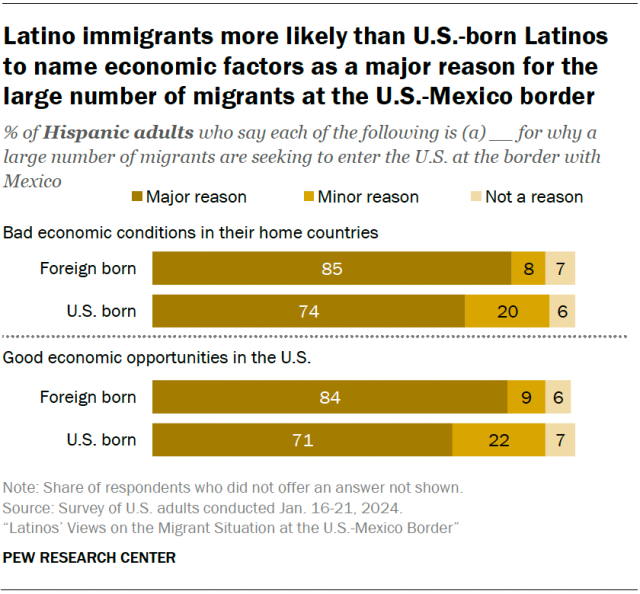
Yet Latino immigrants are slightly more likely than U.S.-born Latinos to cite these economic factors as major reasons for the border situation.
- 85% of immigrants say bad economic conditions in migrants’ home countries are a major reason, compared with 74% of those who are U.S. born.
- 84% of immigrants say good economic opportunities in the U.S. are a major reason, while 71% among those who are U.S. born say the same.
Meanwhile, U.S.-born and immigrant Latinos shares similar views when it comes to violence in migrants’ home countries, migrants’ belief that U.S. policies with help them stay, and greater political freedoms in the U.S. as major reasons for why many migrants are seeking to enter the country.
How closely do Latinos follow news about the migrant situation at the border?
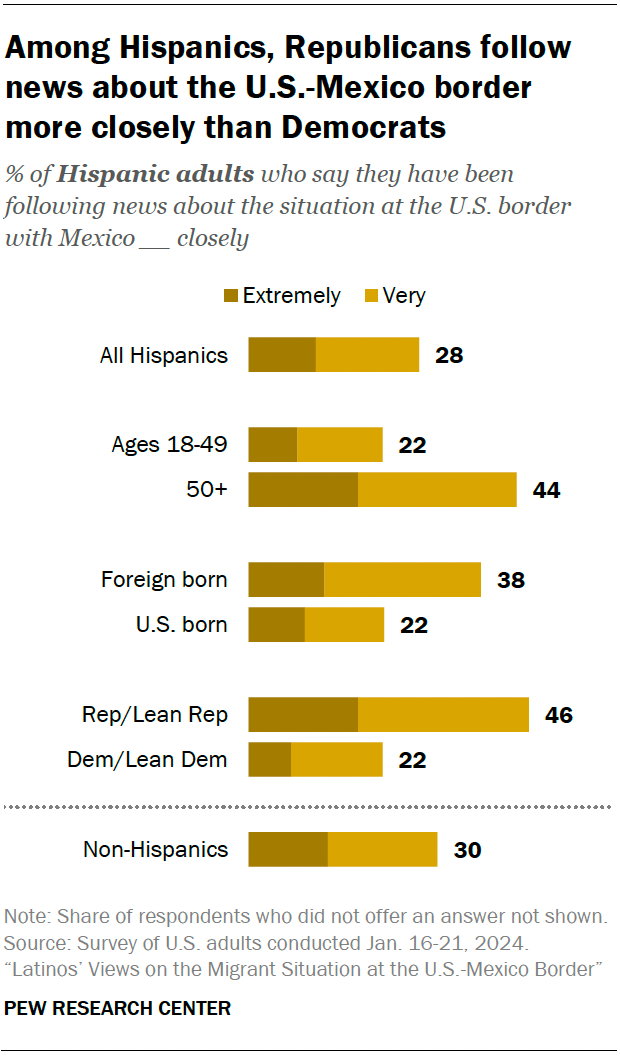
About three-in-ten Hispanics (28%) say they have been following the migrant situation at the U.S. border with Mexico extremely or very closely, similar to the share saying this among non-Hispanics (30%).
Just like the U.S. general population, how much attention Latinos have been paying to the border situation differs widely by age and partisanship.
By age
- 22% of younger Latinos (ages 18 to 49) are following the situation extremely or very closely, while 44% of Latinos 50 and older say the same.
By nativity
- Immigrant Hispanics are more likely than U.S.-born Hispanics to say they follow the news about the border closely (38% vs. 22%).
By partisanship
- 46% of Latino Republicans say they are paying extremely or very close attention to the border situation, compared with 22% of Latino Democrats.
Hispanics are split on whether U.S. crime levels are affected by the border situation
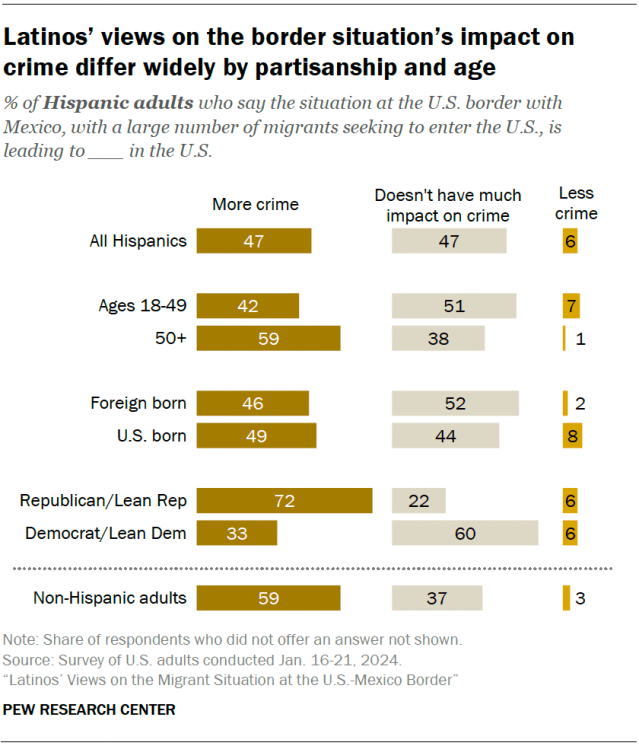
Views among U.S. Latinos are mixed on whether the current migrant situation at the border is affecting crime levels in the country, both overall and by key demographic subgroups.
- 47% of Latinos say the migrant situation at the border is leading to more crime, while 47% say it does not have an impact on crime and 6% say it is leading to less crime.
By age
- 59% of Latinos ages 50 and older say the migrant situation at the border is leading to more crime in the U.S., while 42% of those ages 18 to 49 say this.
- 51% of Latino adults under age 50 say the migrant situation does not have much impact on crime in the country, compared with 38% among Latinos 50 and older.
By partisanship
- A majority of Latino Republicans (72%) say the migrant situation is leading to more crime, much higher than the share among Latino Democrats (33%).
- On the other hand, six-in-ten Latino Democrats say the increase in migrants at the border is having little impact on crime levels in the country. Just 22% of Latino Republicans say the same.
Among non-Hispanics
- A majority of non-Hispanic adults (59%) say the migrant situation is leading to more crime, while 37% say there is little relationship between the migrant situation at the border and crime levels in the U.S.



Be the first to comment